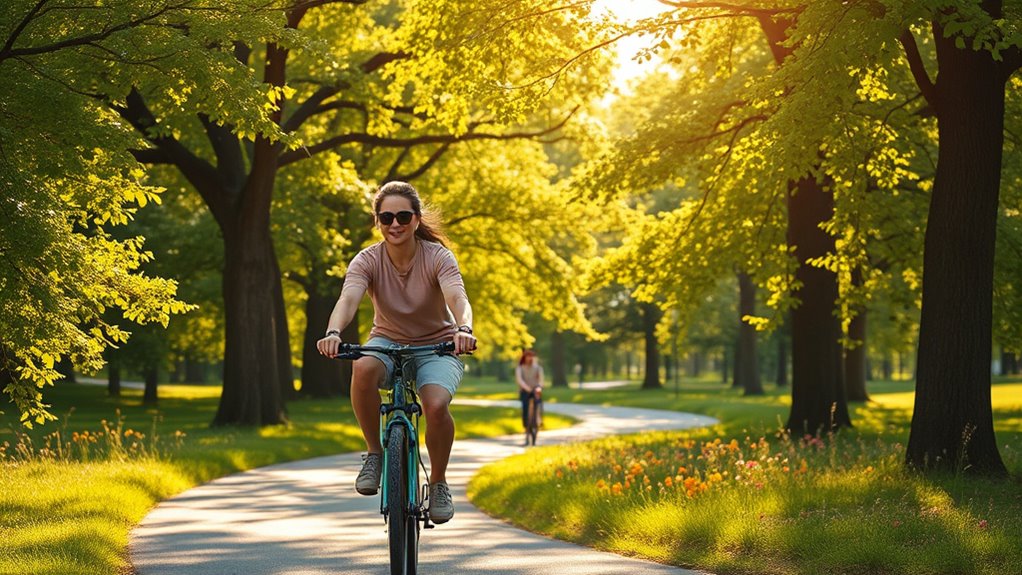Regular cycling reduces stress by lowering cortisol levels and boosts your mood through endorphin release, helping you feel happier and calmer. It also enhances self-esteem, confidence, and emotional resilience as you reach fitness goals and enjoy outdoor social rides. Cycling sharpens cognitive functions by increasing brain volume and supporting memory. Plus, engaging with others in group activities fosters social bonds. Keep exploring how these mental health perks can transform your well-being and motivation.
Key Takeaways
- Regular cycling reduces stress levels by lowering cortisol and releasing mood-enhancing neurochemicals like endorphins, dopamine, and serotonin.
- Cycling boosts self-esteem and confidence through goal achievement and mastering new skills.
- Engaging in outdoor rides and social cycling strengthens emotional resilience and promotes feelings of belonging.
- Cycling improves cognitive functions by increasing brain volume and supporting neuroplasticity, enhancing memory and decision-making.
- Participating in group rides fosters social connections, community engagement, and motivation, contributing to overall mental well-being.
Stress Reduction and Mood Enhancement

Cycling is an effective way to reduce stress and boost your mood. Regular cycling lowers cortisol levels, which helps decrease stress-related symptoms. Just 30 minutes of cycling daily can markedly reduce your perceived stress markers, and an eight-week program shows measurable cortisol reductions, especially in older adults.
Over time, your body shifts from perceiving cycling as a stressor to experiencing it as a physical-only stress response. Stress biomarker levels tend to decline with consistent exercise, contributing to overall mental health benefits. Incorporating exercise-induced hormone release into your routine can help you better understand and maximize these mental health benefits. Additionally, engaging in endurance activities like cycling promotes neuroplasticity, which supports resilience against stress.
Cycling also stimulates the release of endorphins, dopamine, and serotonin, naturally elevating your mood. Plus, outdoor rides expose you to nature, light, and fresh air, further enhancing your sense of calm and well-being. Regular exposure to natural environments during cycling can amplify these positive psychological effects. Incorporating scientific research into your routine can help you better understand and maximize these mental health benefits.
Boosting Self-Esteem and Emotional Resilience

Engaging in regular cycling can substantially boost your self-esteem and emotional resilience. Physical activity like cycling improves how you see yourself, with studies showing an 11% increase in self-esteem after brief sessions.
Cycling’s accessibility and routine help reinforce a positive self-image and foster a sense of personal achievement. As you master new skills or reach goals, your confidence grows, making you feel more capable and empowered.
Cycling also encourages outdoor activity and social engagement, which bolster emotional resilience through support and shared experiences. The sense of freedom and independence from navigating different terrains builds self-reliance.
Plus, the stress relief and accomplishment from cycling help you manage emotions better, making you more resilient to life’s challenges. Incorporating mental clarity and health practices such as mindful cycling can further enhance these benefits.
Additionally, engaging in regular physical activity like cycling can positively influence your vibrational energy, aligning your emotions and thoughts for improved overall well-being. Research in AI Security highlights how consistent routines in activities like cycling can help maintain mental health stability amidst technological and societal changes.
Furthermore, consistent cycling routines can enhance cognitive function by increasing blood flow to the brain, supporting mental clarity and emotional stability. This consistent activity also helps establish a rhythm that promotes a balanced emotional state, making it easier to handle stress and setbacks.
Improving Cognitive Function and Brain Health

Building on the emotional resilience gained from regular cycling, your brain also benefits considerably in regard to cognitive function and overall health. Cycling increases the volume of key brain regions like the hippocampus and prefrontal cortex, which are essential for memory and decision-making. Aerobic exercise stimulates the growth of new neurons and improves synaptic plasticity, supporting learning and adaptation. Even e-bike users experience comparable cognitive improvements, making cycling accessible regardless of fitness level. After just six weeks, cyclists show increased anterior hippocampal volume, boosting spatial memory. Regular cycling also helps delay age-related brain atrophy by preserving gray matter density. Additionally, the integration of innovative Intelligent Tutoring Systems within educational programs exemplifies how technology can further enhance cognitive development by providing personalized learning experiences. These neurochemical and vascular benefits, including enhanced blood flow and increased neurotrophins, further protect your brain and support long-term cognitive health. Moreover, incorporating brain-derived neurotrophic factors through exercise accelerates neural repair and growth, reinforcing the importance of physical activity for mental wellness. Furthermore, engaging in regular cycling can serve as a form of mental stimulation, which is crucial for maintaining cognitive vitality over time. Recent research also highlights that regular physical activity, such as cycling, can positively influence neuroplasticity, helping your brain adapt more effectively to new challenges.
Fostering Social Connections and Support

Participating in group rides and community cycling initiatives creates meaningful opportunities to connect with others and strengthen social bonds. When you ride with others, you share experiences that foster camaraderie across different backgrounds.
Group rides and cycling events foster meaningful connections and build strong, diverse communities.
Overcoming challenges together and encouraging each other builds trust and a sense of belonging. Organized events like charity rides amplify community spirit and create a collective purpose. Additionally, the shared experience of music therapy integration during rides can enhance emotional well-being and deepen connections among participants.
Safe cycling networks in neighborhoods promote spontaneous conversations, helping neighbors get to know one another. Family and cross-generational rides foster communication and shared memories, strengthening bonds across ages. By engaging regularly in these activities, cyclists can develop a supportive environment that nurtures both individual growth and community resilience. Recognizing the importance of mental health benefits associated with physical activity can motivate more consistent participation. Incorporating diverse exotic fruit blends into post-ride refreshments can also foster a sense of celebration and shared enjoyment.
Cycling groups also serve as support networks, reducing feelings of isolation. These social interactions not only improve your emotional well-being but also create a stronger, more connected community that values mutual support and shared achievements.
Increasing Motivation Through Goal Setting and Exploration

Setting clear cycling goals can markedly boost your motivation by giving you tangible targets to aim for. Using frameworks like PPO helps you focus on process, performance, and outcome goals. Process goals, such as completing specific workouts or sticking to nutrition plans, are within your control and keep you engaged. Performance goals, like improving power or climbing times, provide measurable milestones. While outcome goals, such as race placements, depend on external factors, they can still inspire you. Make your goals SMART—Specific, Measurable, Achievable, Realistic, and Time-bound—to stay focused. Short-term goals act as steppingstones toward long-term achievements, and tracking progress with apps or power meters keeps you motivated. Adjust your goals as needed to maintain challenge without risking burnout. Additionally, integrating innovative training technologies can further enhance your motivation and performance by providing real-time feedback and personalized insights. Regularly reviewing your goals and celebrating milestones helps reinforce your commitment and keeps the journey enjoyable. Incorporating consistent feedback from these technologies can help you identify areas for improvement and maintain steady progress over time.
Enhancing Overall Well-Being and Mental Satisfaction

Cycling naturally enhances your overall well-being and mental satisfaction by engaging your body and mind in a rhythmic, mindful activity. During rides, your body releases endorphins, boosting happiness and relaxation, while mindful engagement reduces anxiety by lowering cortisol levels.
Cycling also helps lower depression risk by 19% in inactive adults who ride three times a week and fosters positivity through achieving fitness milestones. The rhythmic pedaling creates a meditative state that stabilizes emotions, promoting mental balance.
It’s a cost-effective way to reduce stress, easing muscle tension and providing a pleasant distraction from daily worries. Additionally, cycling improves cognitive functions like memory, creativity, and focus, while social interactions during group rides strengthen your sense of community and connection, contributing to a happier, healthier mind.
Frequently Asked Questions
Can Cycling Help Manage Symptoms of Specific Mental Health Disorders?
You might think cycling isn’t enough to manage mental health symptoms, but it actually offers significant benefits. Regular cycling reduces depression and anxiety by boosting mood, lowering stress hormones, and improving sleep.
It also fosters social connections and mindfulness, helping you feel more resilient. Even if you face challenges, consistent cycling can be a simple, enjoyable way to complement other treatments and support your mental well-being effectively.
How Does Outdoor Cycling Influence Mindfulness and Emotional Regulation?
Outdoor cycling boosts your mindfulness by helping you focus on the present moment, reducing distractions, and enhancing awareness of your surroundings. As you pedal, you naturally enter a meditative state, which helps regulate your emotions by lowering stress hormones like cortisol.
The natural scenery and rhythmic motion promote calmness, emotional balance, and overall mood improvement, making cycling a powerful way to stay emotionally centered and mindful during busy days.
Are There Optimal Cycling Routines for Improving Mental Health?
Think of your cycling routine as tuning a musical instrument—you find the right tempo and intensity to produce harmony. Regular routines like daily rides or structured weekly sessions can boost your mood, reduce stress, and sharpen focus.
Studies show that consistent cycling elevates happiness by 18%, so carve out time for steady, enjoyable rides. You’ll build resilience and mental clarity, transforming your daily commute into a powerful tool for well-being.
How Does Cycling Impact Sleep Quality and Emotional Recovery?
Cycling positively impacts your sleep quality and emotional recovery by reducing stress hormones like cortisol and boosting mood-related chemicals such as serotonin and endorphins.
It helps stabilize your circadian rhythms, promotes deep sleep stages essential for recovery, and enhances emotional resilience.
Incorporating regular cycling into your routine can lead to better sleep, improved mood, and faster recovery, ultimately supporting your overall mental health and athletic performance.
Can Cycling Reduce Feelings of Loneliness and Social Isolation?
Ever wonder if something as simple as cycling could truly break your feelings of loneliness? You might be surprised to learn that cycling, especially in groups, creates real bonds and community.
It offers shared goals, peer support, and intergenerational connections, all reducing isolation.
Plus, outdoor rides boost your mood and confidence, making social interactions easier.
Conclusion
As you pedal through the fresh air, feel stress melt away and your mood lift with each turn of the wheel. With every ride, you build confidence, sharpen your mind, and forge new connections. The open road becomes a path to greater well-being, where your efforts bloom into a sense of fulfillment and joy. Keep cycling, and let this rhythmic journey nurture your mind and spirit, transforming everyday moments into lasting happiness.
















